Group Assignment: Business and Corporate Law Case Studies HI6027
VerifiedAdded on 2023/03/20
|9
|2496
|94
Report
AI Summary
This report presents a comprehensive analysis of two business law case studies. Part A focuses on the agency relationship between Swimmingpool Co. and its manager, Martin, examining issues of vicarious liability, the scope of authority, and the consequences of Martin's actions, including his potential competition with the company and misappropriation of funds. The analysis considers relevant legal principles and case law, such as Tooth v Laws, Australia and New Zealand Bank Ltd v Ateliers de Constructions Electriques de Charleroi, and Shaddock v Parramatta City Council, to determine Swimmingpool Co.'s liability and Martin's breaches of duty. Part B examines a partnership scenario involving Seamus, Lucy, and Koo (LuSeKo), addressing the existence of a partnership, liabilities of partners, breaches of duty, and the implications of Seamus's death. The analysis applies the Partnership Act 1963 and relevant case law to determine the partners' rights, obligations, and potential liabilities, including the acquisition of a ride-on mower and Lucy's weekend work, the actions of FastCut, and the impact of Seamus's death on the partnership's dissolution.
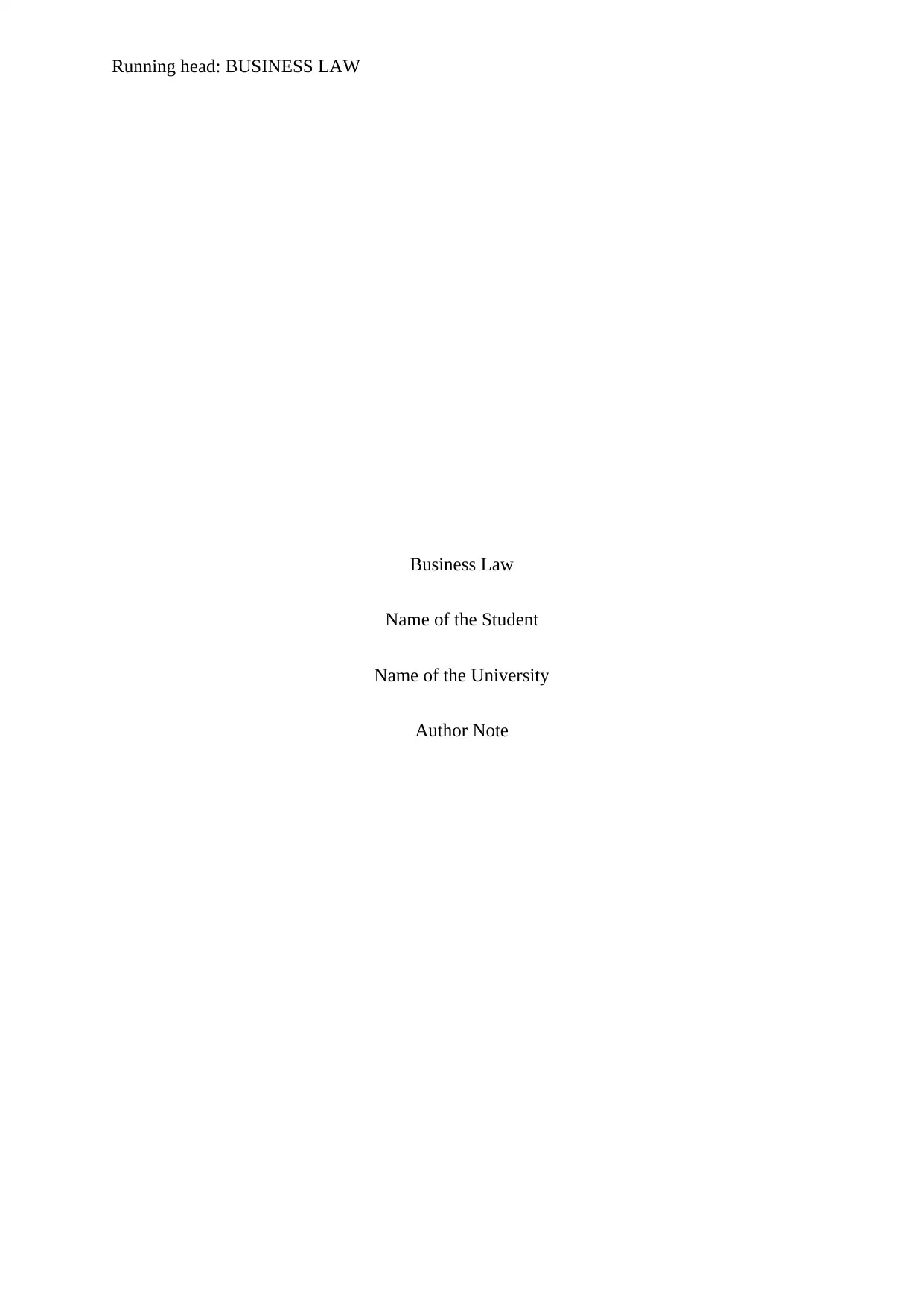
Running head: BUSINESS LAW
Business Law
Name of the Student
Name of the University
Author Note
Business Law
Name of the Student
Name of the University
Author Note
Paraphrase This Document
Need a fresh take? Get an instant paraphrase of this document with our AI Paraphraser
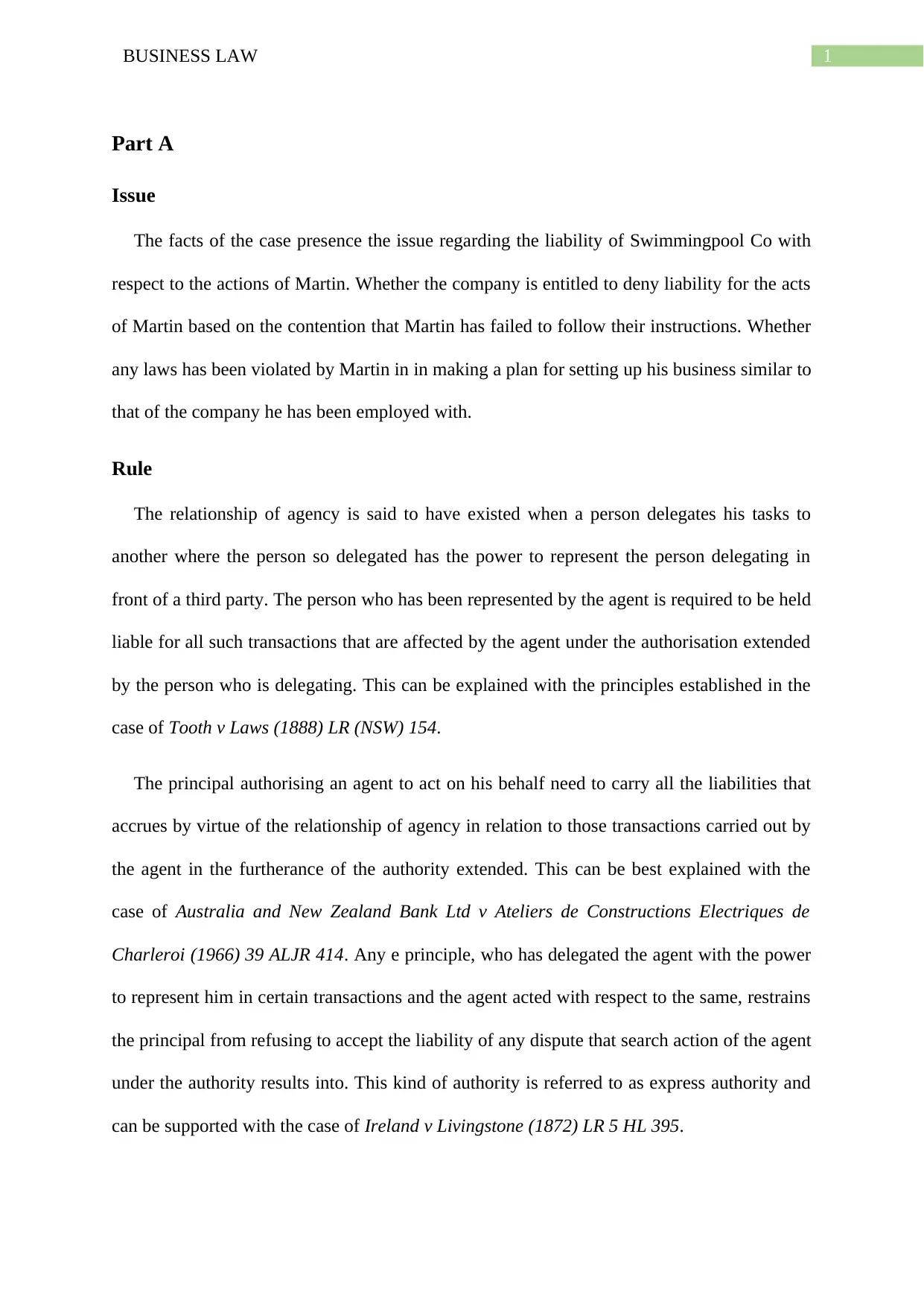
1BUSINESS LAW
Part A
Issue
The facts of the case presence the issue regarding the liability of Swimmingpool Co with
respect to the actions of Martin. Whether the company is entitled to deny liability for the acts
of Martin based on the contention that Martin has failed to follow their instructions. Whether
any laws has been violated by Martin in in making a plan for setting up his business similar to
that of the company he has been employed with.
Rule
The relationship of agency is said to have existed when a person delegates his tasks to
another where the person so delegated has the power to represent the person delegating in
front of a third party. The person who has been represented by the agent is required to be held
liable for all such transactions that are affected by the agent under the authorisation extended
by the person who is delegating. This can be explained with the principles established in the
case of Tooth v Laws (1888) LR (NSW) 154.
The principal authorising an agent to act on his behalf need to carry all the liabilities that
accrues by virtue of the relationship of agency in relation to those transactions carried out by
the agent in the furtherance of the authority extended. This can be best explained with the
case of Australia and New Zealand Bank Ltd v Ateliers de Constructions Electriques de
Charleroi (1966) 39 ALJR 414. Any e principle, who has delegated the agent with the power
to represent him in certain transactions and the agent acted with respect to the same, restrains
the principal from refusing to accept the liability of any dispute that search action of the agent
under the authority results into. This kind of authority is referred to as express authority and
can be supported with the case of Ireland v Livingstone (1872) LR 5 HL 395.
Part A
Issue
The facts of the case presence the issue regarding the liability of Swimmingpool Co with
respect to the actions of Martin. Whether the company is entitled to deny liability for the acts
of Martin based on the contention that Martin has failed to follow their instructions. Whether
any laws has been violated by Martin in in making a plan for setting up his business similar to
that of the company he has been employed with.
Rule
The relationship of agency is said to have existed when a person delegates his tasks to
another where the person so delegated has the power to represent the person delegating in
front of a third party. The person who has been represented by the agent is required to be held
liable for all such transactions that are affected by the agent under the authorisation extended
by the person who is delegating. This can be explained with the principles established in the
case of Tooth v Laws (1888) LR (NSW) 154.
The principal authorising an agent to act on his behalf need to carry all the liabilities that
accrues by virtue of the relationship of agency in relation to those transactions carried out by
the agent in the furtherance of the authority extended. This can be best explained with the
case of Australia and New Zealand Bank Ltd v Ateliers de Constructions Electriques de
Charleroi (1966) 39 ALJR 414. Any e principle, who has delegated the agent with the power
to represent him in certain transactions and the agent acted with respect to the same, restrains
the principal from refusing to accept the liability of any dispute that search action of the agent
under the authority results into. This kind of authority is referred to as express authority and
can be supported with the case of Ireland v Livingstone (1872) LR 5 HL 395.
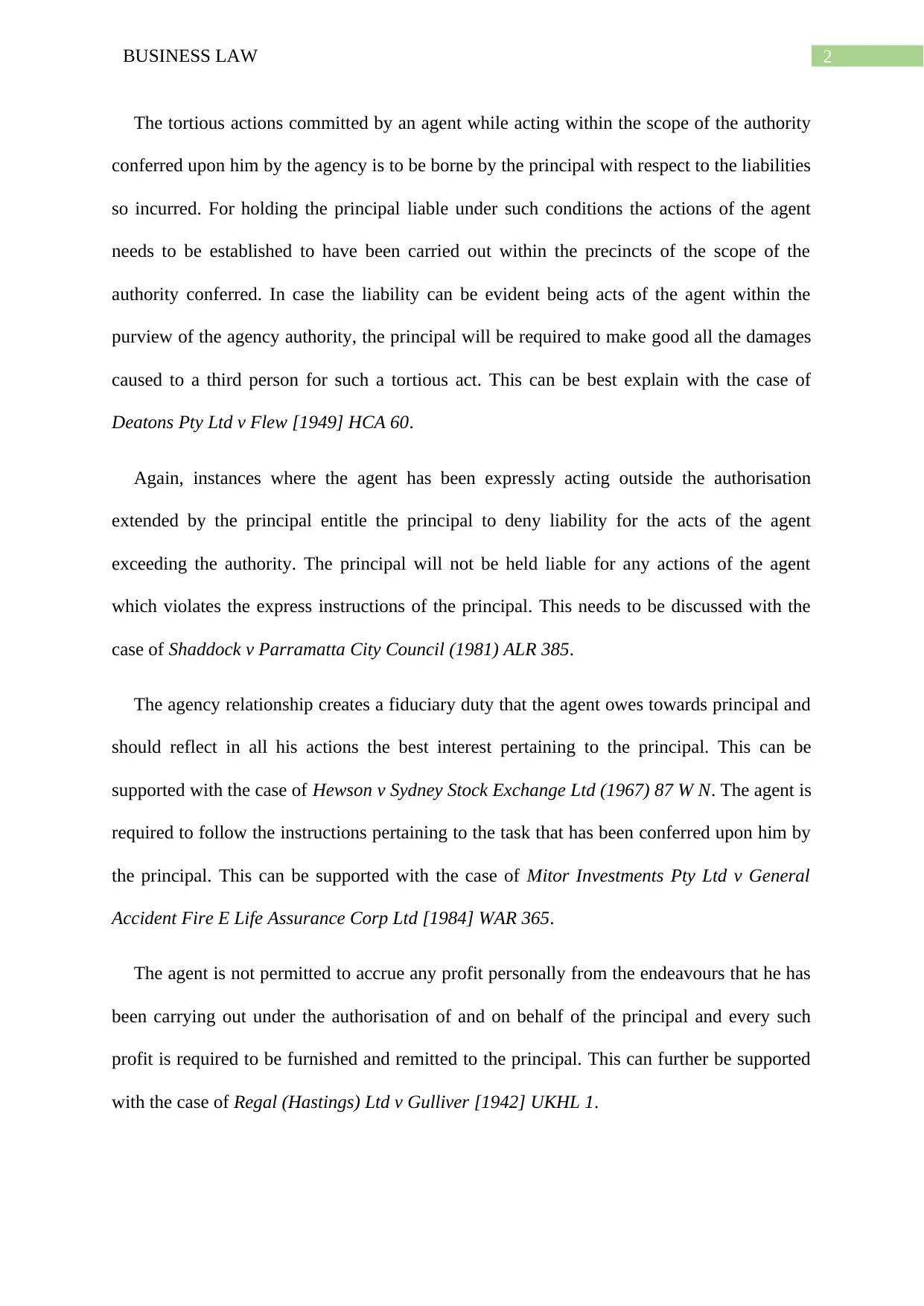
2BUSINESS LAW
The tortious actions committed by an agent while acting within the scope of the authority
conferred upon him by the agency is to be borne by the principal with respect to the liabilities
so incurred. For holding the principal liable under such conditions the actions of the agent
needs to be established to have been carried out within the precincts of the scope of the
authority conferred. In case the liability can be evident being acts of the agent within the
purview of the agency authority, the principal will be required to make good all the damages
caused to a third person for such a tortious act. This can be best explain with the case of
Deatons Pty Ltd v Flew [1949] HCA 60.
Again, instances where the agent has been expressly acting outside the authorisation
extended by the principal entitle the principal to deny liability for the acts of the agent
exceeding the authority. The principal will not be held liable for any actions of the agent
which violates the express instructions of the principal. This needs to be discussed with the
case of Shaddock v Parramatta City Council (1981) ALR 385.
The agency relationship creates a fiduciary duty that the agent owes towards principal and
should reflect in all his actions the best interest pertaining to the principal. This can be
supported with the case of Hewson v Sydney Stock Exchange Ltd (1967) 87 W N. The agent is
required to follow the instructions pertaining to the task that has been conferred upon him by
the principal. This can be supported with the case of Mitor Investments Pty Ltd v General
Accident Fire E Life Assurance Corp Ltd [1984] WAR 365.
The agent is not permitted to accrue any profit personally from the endeavours that he has
been carrying out under the authorisation of and on behalf of the principal and every such
profit is required to be furnished and remitted to the principal. This can further be supported
with the case of Regal (Hastings) Ltd v Gulliver [1942] UKHL 1.
The tortious actions committed by an agent while acting within the scope of the authority
conferred upon him by the agency is to be borne by the principal with respect to the liabilities
so incurred. For holding the principal liable under such conditions the actions of the agent
needs to be established to have been carried out within the precincts of the scope of the
authority conferred. In case the liability can be evident being acts of the agent within the
purview of the agency authority, the principal will be required to make good all the damages
caused to a third person for such a tortious act. This can be best explain with the case of
Deatons Pty Ltd v Flew [1949] HCA 60.
Again, instances where the agent has been expressly acting outside the authorisation
extended by the principal entitle the principal to deny liability for the acts of the agent
exceeding the authority. The principal will not be held liable for any actions of the agent
which violates the express instructions of the principal. This needs to be discussed with the
case of Shaddock v Parramatta City Council (1981) ALR 385.
The agency relationship creates a fiduciary duty that the agent owes towards principal and
should reflect in all his actions the best interest pertaining to the principal. This can be
supported with the case of Hewson v Sydney Stock Exchange Ltd (1967) 87 W N. The agent is
required to follow the instructions pertaining to the task that has been conferred upon him by
the principal. This can be supported with the case of Mitor Investments Pty Ltd v General
Accident Fire E Life Assurance Corp Ltd [1984] WAR 365.
The agent is not permitted to accrue any profit personally from the endeavours that he has
been carrying out under the authorisation of and on behalf of the principal and every such
profit is required to be furnished and remitted to the principal. This can further be supported
with the case of Regal (Hastings) Ltd v Gulliver [1942] UKHL 1.
⊘ This is a preview!⊘
Do you want full access?
Subscribe today to unlock all pages.

Trusted by 1+ million students worldwide
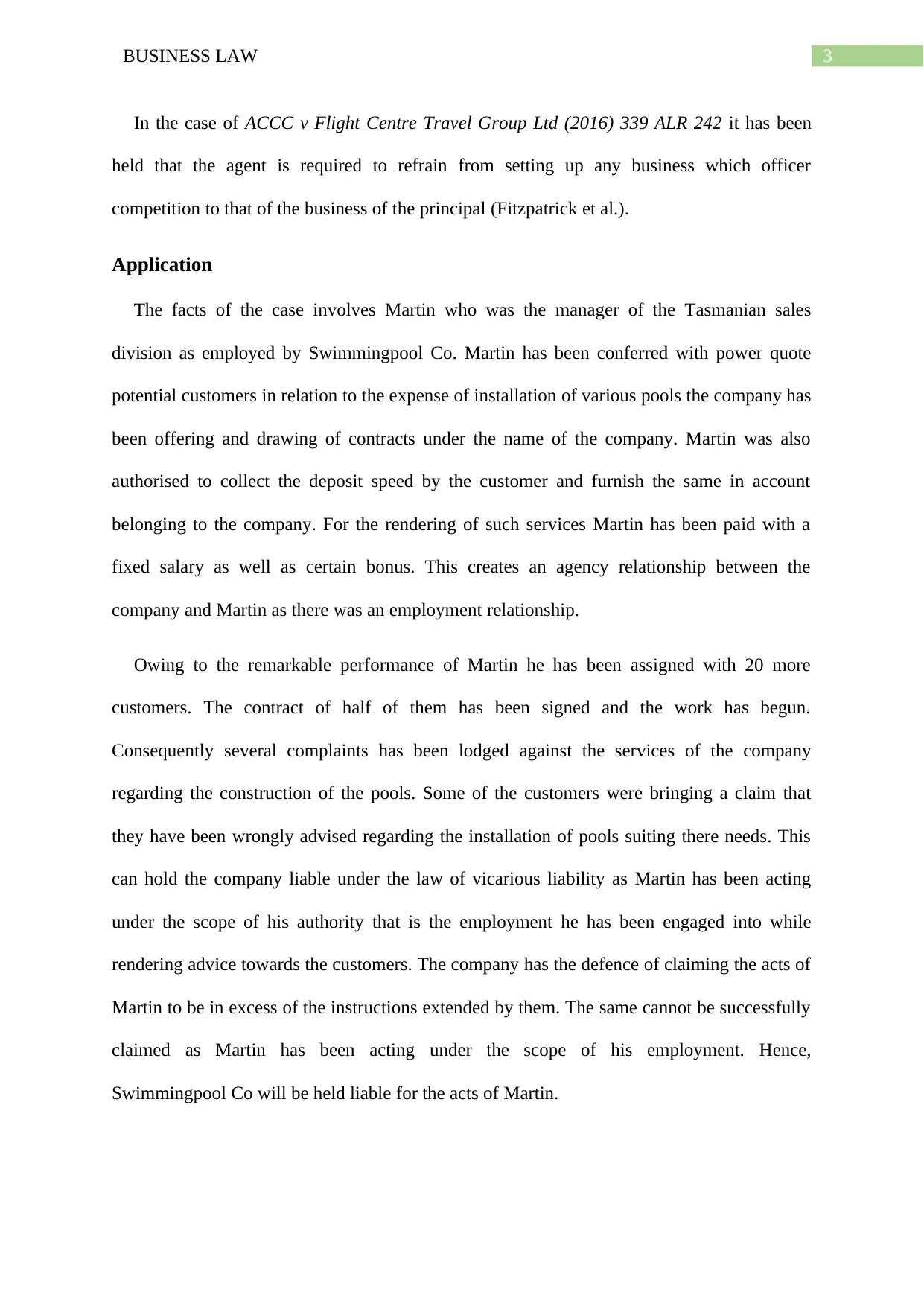
3BUSINESS LAW
In the case of ACCC v Flight Centre Travel Group Ltd (2016) 339 ALR 242 it has been
held that the agent is required to refrain from setting up any business which officer
competition to that of the business of the principal (Fitzpatrick et al.).
Application
The facts of the case involves Martin who was the manager of the Tasmanian sales
division as employed by Swimmingpool Co. Martin has been conferred with power quote
potential customers in relation to the expense of installation of various pools the company has
been offering and drawing of contracts under the name of the company. Martin was also
authorised to collect the deposit speed by the customer and furnish the same in account
belonging to the company. For the rendering of such services Martin has been paid with a
fixed salary as well as certain bonus. This creates an agency relationship between the
company and Martin as there was an employment relationship.
Owing to the remarkable performance of Martin he has been assigned with 20 more
customers. The contract of half of them has been signed and the work has begun.
Consequently several complaints has been lodged against the services of the company
regarding the construction of the pools. Some of the customers were bringing a claim that
they have been wrongly advised regarding the installation of pools suiting there needs. This
can hold the company liable under the law of vicarious liability as Martin has been acting
under the scope of his authority that is the employment he has been engaged into while
rendering advice towards the customers. The company has the defence of claiming the acts of
Martin to be in excess of the instructions extended by them. The same cannot be successfully
claimed as Martin has been acting under the scope of his employment. Hence,
Swimmingpool Co will be held liable for the acts of Martin.
In the case of ACCC v Flight Centre Travel Group Ltd (2016) 339 ALR 242 it has been
held that the agent is required to refrain from setting up any business which officer
competition to that of the business of the principal (Fitzpatrick et al.).
Application
The facts of the case involves Martin who was the manager of the Tasmanian sales
division as employed by Swimmingpool Co. Martin has been conferred with power quote
potential customers in relation to the expense of installation of various pools the company has
been offering and drawing of contracts under the name of the company. Martin was also
authorised to collect the deposit speed by the customer and furnish the same in account
belonging to the company. For the rendering of such services Martin has been paid with a
fixed salary as well as certain bonus. This creates an agency relationship between the
company and Martin as there was an employment relationship.
Owing to the remarkable performance of Martin he has been assigned with 20 more
customers. The contract of half of them has been signed and the work has begun.
Consequently several complaints has been lodged against the services of the company
regarding the construction of the pools. Some of the customers were bringing a claim that
they have been wrongly advised regarding the installation of pools suiting there needs. This
can hold the company liable under the law of vicarious liability as Martin has been acting
under the scope of his authority that is the employment he has been engaged into while
rendering advice towards the customers. The company has the defence of claiming the acts of
Martin to be in excess of the instructions extended by them. The same cannot be successfully
claimed as Martin has been acting under the scope of his employment. Hence,
Swimmingpool Co will be held liable for the acts of Martin.
Paraphrase This Document
Need a fresh take? Get an instant paraphrase of this document with our AI Paraphraser
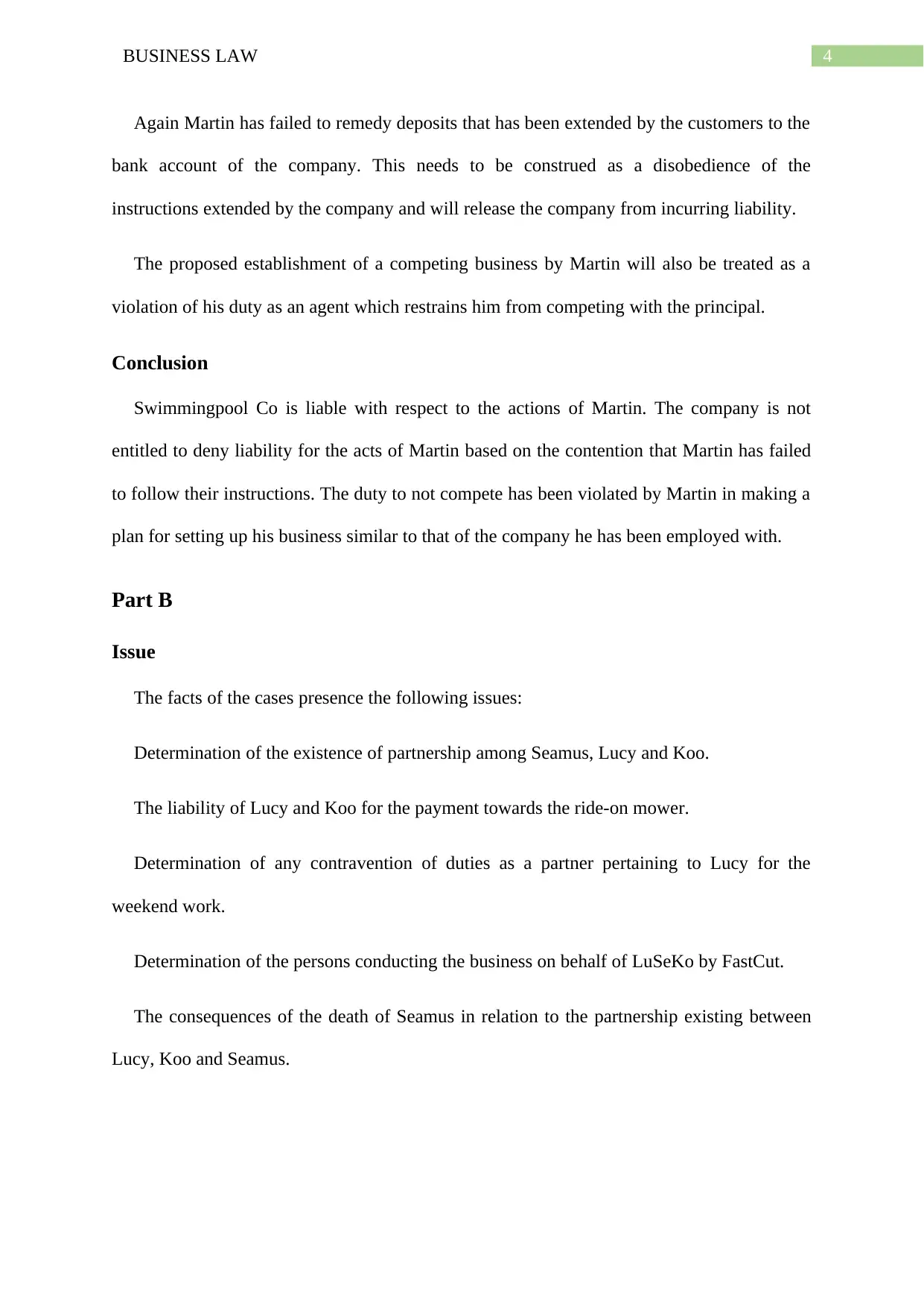
4BUSINESS LAW
Again Martin has failed to remedy deposits that has been extended by the customers to the
bank account of the company. This needs to be construed as a disobedience of the
instructions extended by the company and will release the company from incurring liability.
The proposed establishment of a competing business by Martin will also be treated as a
violation of his duty as an agent which restrains him from competing with the principal.
Conclusion
Swimmingpool Co is liable with respect to the actions of Martin. The company is not
entitled to deny liability for the acts of Martin based on the contention that Martin has failed
to follow their instructions. The duty to not compete has been violated by Martin in making a
plan for setting up his business similar to that of the company he has been employed with.
Part B
Issue
The facts of the cases presence the following issues:
Determination of the existence of partnership among Seamus, Lucy and Koo.
The liability of Lucy and Koo for the payment towards the ride-on mower.
Determination of any contravention of duties as a partner pertaining to Lucy for the
weekend work.
Determination of the persons conducting the business on behalf of LuSeKo by FastCut.
The consequences of the death of Seamus in relation to the partnership existing between
Lucy, Koo and Seamus.
Again Martin has failed to remedy deposits that has been extended by the customers to the
bank account of the company. This needs to be construed as a disobedience of the
instructions extended by the company and will release the company from incurring liability.
The proposed establishment of a competing business by Martin will also be treated as a
violation of his duty as an agent which restrains him from competing with the principal.
Conclusion
Swimmingpool Co is liable with respect to the actions of Martin. The company is not
entitled to deny liability for the acts of Martin based on the contention that Martin has failed
to follow their instructions. The duty to not compete has been violated by Martin in making a
plan for setting up his business similar to that of the company he has been employed with.
Part B
Issue
The facts of the cases presence the following issues:
Determination of the existence of partnership among Seamus, Lucy and Koo.
The liability of Lucy and Koo for the payment towards the ride-on mower.
Determination of any contravention of duties as a partner pertaining to Lucy for the
weekend work.
Determination of the persons conducting the business on behalf of LuSeKo by FastCut.
The consequences of the death of Seamus in relation to the partnership existing between
Lucy, Koo and Seamus.
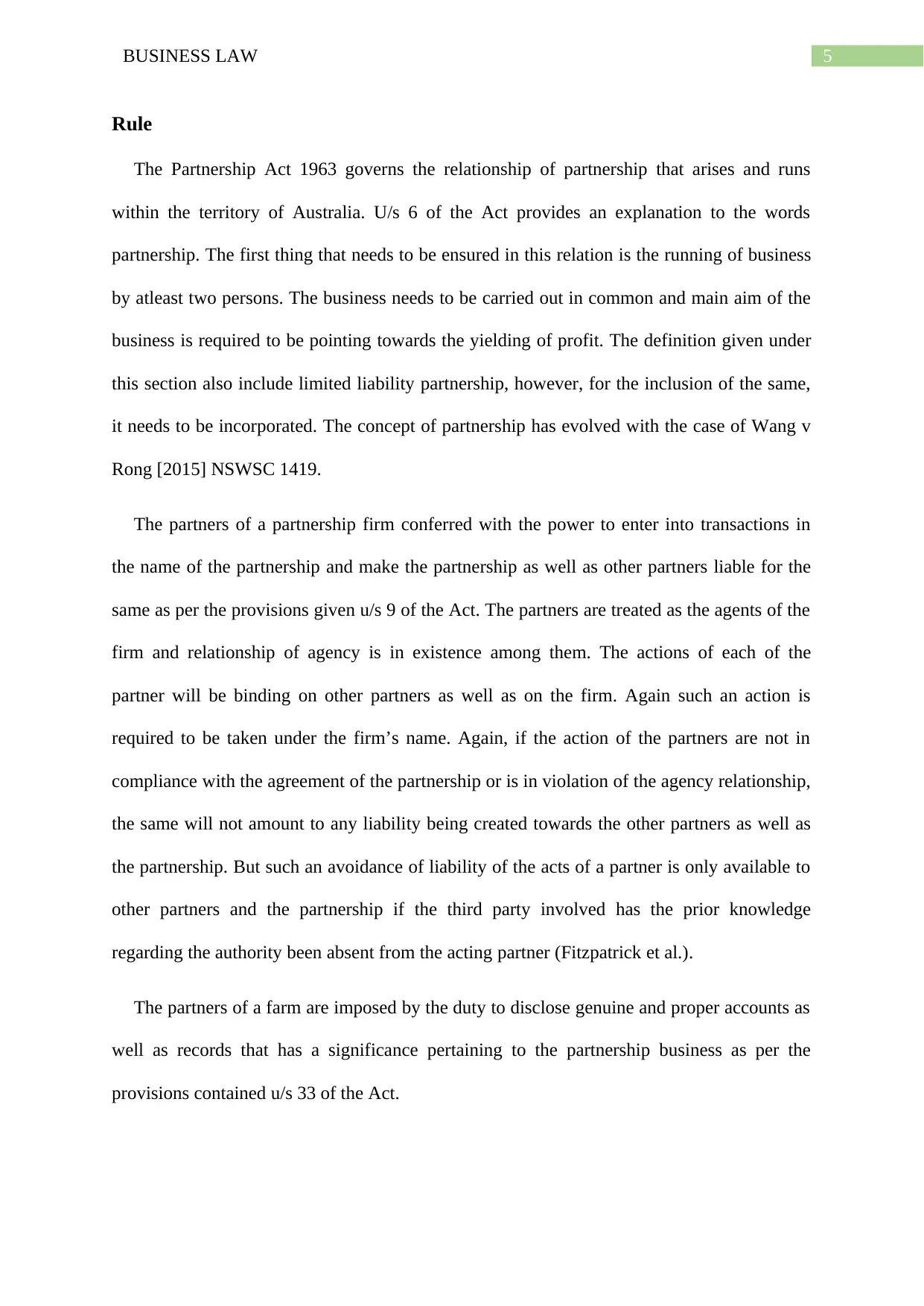
5BUSINESS LAW
Rule
The Partnership Act 1963 governs the relationship of partnership that arises and runs
within the territory of Australia. U/s 6 of the Act provides an explanation to the words
partnership. The first thing that needs to be ensured in this relation is the running of business
by atleast two persons. The business needs to be carried out in common and main aim of the
business is required to be pointing towards the yielding of profit. The definition given under
this section also include limited liability partnership, however, for the inclusion of the same,
it needs to be incorporated. The concept of partnership has evolved with the case of Wang v
Rong [2015] NSWSC 1419.
The partners of a partnership firm conferred with the power to enter into transactions in
the name of the partnership and make the partnership as well as other partners liable for the
same as per the provisions given u/s 9 of the Act. The partners are treated as the agents of the
firm and relationship of agency is in existence among them. The actions of each of the
partner will be binding on other partners as well as on the firm. Again such an action is
required to be taken under the firm’s name. Again, if the action of the partners are not in
compliance with the agreement of the partnership or is in violation of the agency relationship,
the same will not amount to any liability being created towards the other partners as well as
the partnership. But such an avoidance of liability of the acts of a partner is only available to
other partners and the partnership if the third party involved has the prior knowledge
regarding the authority been absent from the acting partner (Fitzpatrick et al.).
The partners of a farm are imposed by the duty to disclose genuine and proper accounts as
well as records that has a significance pertaining to the partnership business as per the
provisions contained u/s 33 of the Act.
Rule
The Partnership Act 1963 governs the relationship of partnership that arises and runs
within the territory of Australia. U/s 6 of the Act provides an explanation to the words
partnership. The first thing that needs to be ensured in this relation is the running of business
by atleast two persons. The business needs to be carried out in common and main aim of the
business is required to be pointing towards the yielding of profit. The definition given under
this section also include limited liability partnership, however, for the inclusion of the same,
it needs to be incorporated. The concept of partnership has evolved with the case of Wang v
Rong [2015] NSWSC 1419.
The partners of a partnership firm conferred with the power to enter into transactions in
the name of the partnership and make the partnership as well as other partners liable for the
same as per the provisions given u/s 9 of the Act. The partners are treated as the agents of the
firm and relationship of agency is in existence among them. The actions of each of the
partner will be binding on other partners as well as on the firm. Again such an action is
required to be taken under the firm’s name. Again, if the action of the partners are not in
compliance with the agreement of the partnership or is in violation of the agency relationship,
the same will not amount to any liability being created towards the other partners as well as
the partnership. But such an avoidance of liability of the acts of a partner is only available to
other partners and the partnership if the third party involved has the prior knowledge
regarding the authority been absent from the acting partner (Fitzpatrick et al.).
The partners of a farm are imposed by the duty to disclose genuine and proper accounts as
well as records that has a significance pertaining to the partnership business as per the
provisions contained u/s 33 of the Act.
⊘ This is a preview!⊘
Do you want full access?
Subscribe today to unlock all pages.

Trusted by 1+ million students worldwide
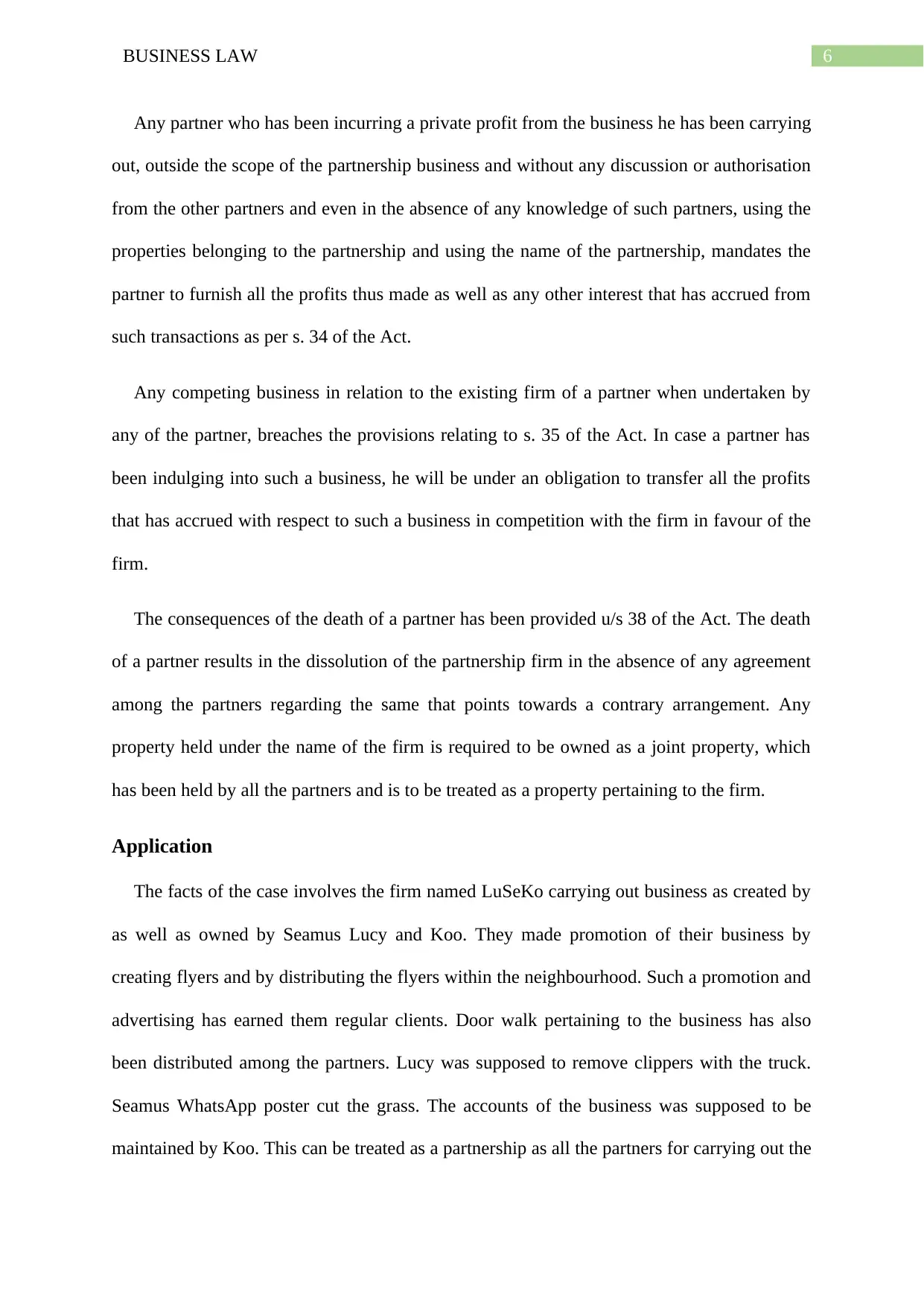
6BUSINESS LAW
Any partner who has been incurring a private profit from the business he has been carrying
out, outside the scope of the partnership business and without any discussion or authorisation
from the other partners and even in the absence of any knowledge of such partners, using the
properties belonging to the partnership and using the name of the partnership, mandates the
partner to furnish all the profits thus made as well as any other interest that has accrued from
such transactions as per s. 34 of the Act.
Any competing business in relation to the existing firm of a partner when undertaken by
any of the partner, breaches the provisions relating to s. 35 of the Act. In case a partner has
been indulging into such a business, he will be under an obligation to transfer all the profits
that has accrued with respect to such a business in competition with the firm in favour of the
firm.
The consequences of the death of a partner has been provided u/s 38 of the Act. The death
of a partner results in the dissolution of the partnership firm in the absence of any agreement
among the partners regarding the same that points towards a contrary arrangement. Any
property held under the name of the firm is required to be owned as a joint property, which
has been held by all the partners and is to be treated as a property pertaining to the firm.
Application
The facts of the case involves the firm named LuSeKo carrying out business as created by
as well as owned by Seamus Lucy and Koo. They made promotion of their business by
creating flyers and by distributing the flyers within the neighbourhood. Such a promotion and
advertising has earned them regular clients. Door walk pertaining to the business has also
been distributed among the partners. Lucy was supposed to remove clippers with the truck.
Seamus WhatsApp poster cut the grass. The accounts of the business was supposed to be
maintained by Koo. This can be treated as a partnership as all the partners for carrying out the
Any partner who has been incurring a private profit from the business he has been carrying
out, outside the scope of the partnership business and without any discussion or authorisation
from the other partners and even in the absence of any knowledge of such partners, using the
properties belonging to the partnership and using the name of the partnership, mandates the
partner to furnish all the profits thus made as well as any other interest that has accrued from
such transactions as per s. 34 of the Act.
Any competing business in relation to the existing firm of a partner when undertaken by
any of the partner, breaches the provisions relating to s. 35 of the Act. In case a partner has
been indulging into such a business, he will be under an obligation to transfer all the profits
that has accrued with respect to such a business in competition with the firm in favour of the
firm.
The consequences of the death of a partner has been provided u/s 38 of the Act. The death
of a partner results in the dissolution of the partnership firm in the absence of any agreement
among the partners regarding the same that points towards a contrary arrangement. Any
property held under the name of the firm is required to be owned as a joint property, which
has been held by all the partners and is to be treated as a property pertaining to the firm.
Application
The facts of the case involves the firm named LuSeKo carrying out business as created by
as well as owned by Seamus Lucy and Koo. They made promotion of their business by
creating flyers and by distributing the flyers within the neighbourhood. Such a promotion and
advertising has earned them regular clients. Door walk pertaining to the business has also
been distributed among the partners. Lucy was supposed to remove clippers with the truck.
Seamus WhatsApp poster cut the grass. The accounts of the business was supposed to be
maintained by Koo. This can be treated as a partnership as all the partners for carrying out the
Paraphrase This Document
Need a fresh take? Get an instant paraphrase of this document with our AI Paraphraser
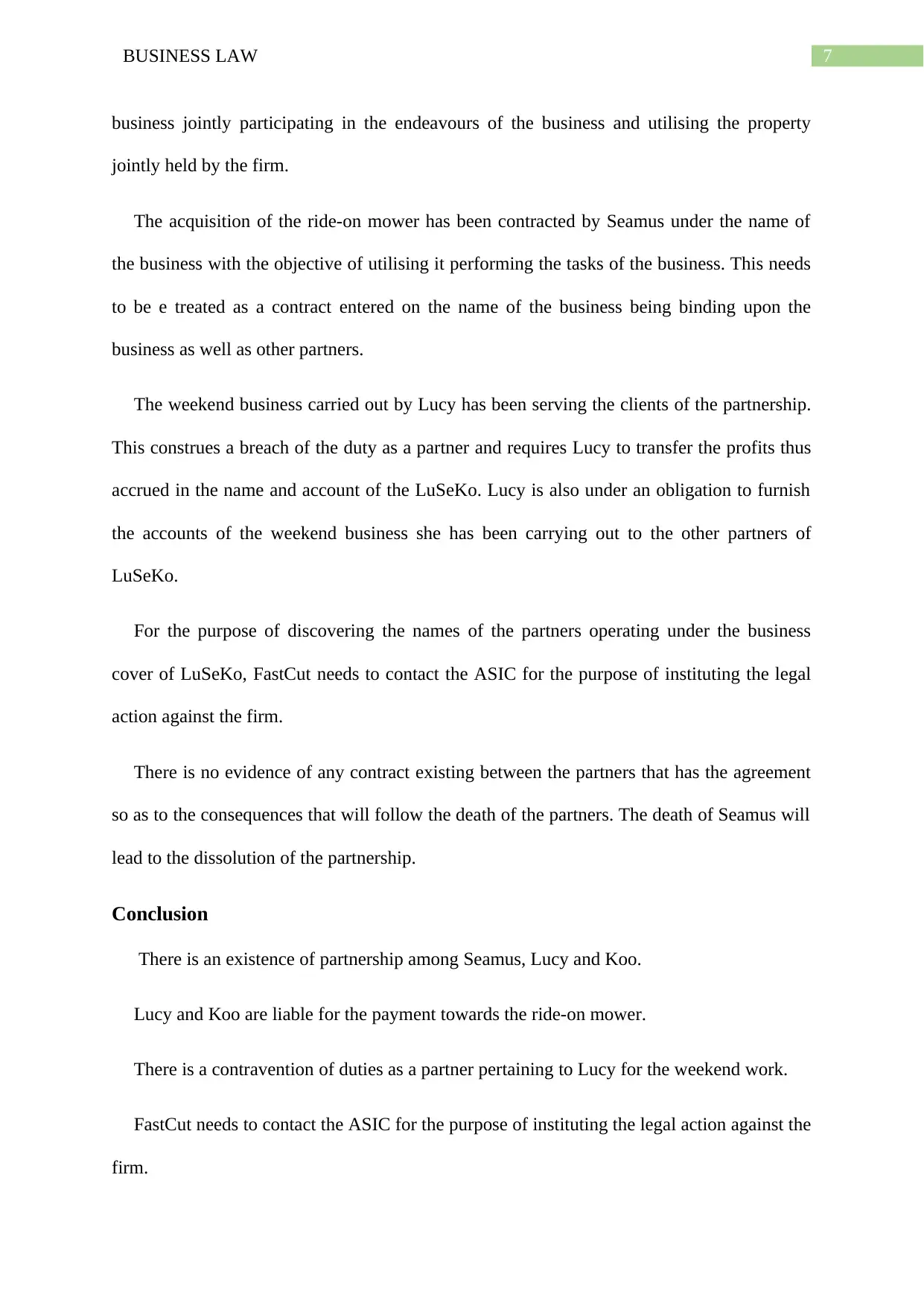
7BUSINESS LAW
business jointly participating in the endeavours of the business and utilising the property
jointly held by the firm.
The acquisition of the ride-on mower has been contracted by Seamus under the name of
the business with the objective of utilising it performing the tasks of the business. This needs
to be e treated as a contract entered on the name of the business being binding upon the
business as well as other partners.
The weekend business carried out by Lucy has been serving the clients of the partnership.
This construes a breach of the duty as a partner and requires Lucy to transfer the profits thus
accrued in the name and account of the LuSeKo. Lucy is also under an obligation to furnish
the accounts of the weekend business she has been carrying out to the other partners of
LuSeKo.
For the purpose of discovering the names of the partners operating under the business
cover of LuSeKo, FastCut needs to contact the ASIC for the purpose of instituting the legal
action against the firm.
There is no evidence of any contract existing between the partners that has the agreement
so as to the consequences that will follow the death of the partners. The death of Seamus will
lead to the dissolution of the partnership.
Conclusion
There is an existence of partnership among Seamus, Lucy and Koo.
Lucy and Koo are liable for the payment towards the ride-on mower.
There is a contravention of duties as a partner pertaining to Lucy for the weekend work.
FastCut needs to contact the ASIC for the purpose of instituting the legal action against the
firm.
business jointly participating in the endeavours of the business and utilising the property
jointly held by the firm.
The acquisition of the ride-on mower has been contracted by Seamus under the name of
the business with the objective of utilising it performing the tasks of the business. This needs
to be e treated as a contract entered on the name of the business being binding upon the
business as well as other partners.
The weekend business carried out by Lucy has been serving the clients of the partnership.
This construes a breach of the duty as a partner and requires Lucy to transfer the profits thus
accrued in the name and account of the LuSeKo. Lucy is also under an obligation to furnish
the accounts of the weekend business she has been carrying out to the other partners of
LuSeKo.
For the purpose of discovering the names of the partners operating under the business
cover of LuSeKo, FastCut needs to contact the ASIC for the purpose of instituting the legal
action against the firm.
There is no evidence of any contract existing between the partners that has the agreement
so as to the consequences that will follow the death of the partners. The death of Seamus will
lead to the dissolution of the partnership.
Conclusion
There is an existence of partnership among Seamus, Lucy and Koo.
Lucy and Koo are liable for the payment towards the ride-on mower.
There is a contravention of duties as a partner pertaining to Lucy for the weekend work.
FastCut needs to contact the ASIC for the purpose of instituting the legal action against the
firm.
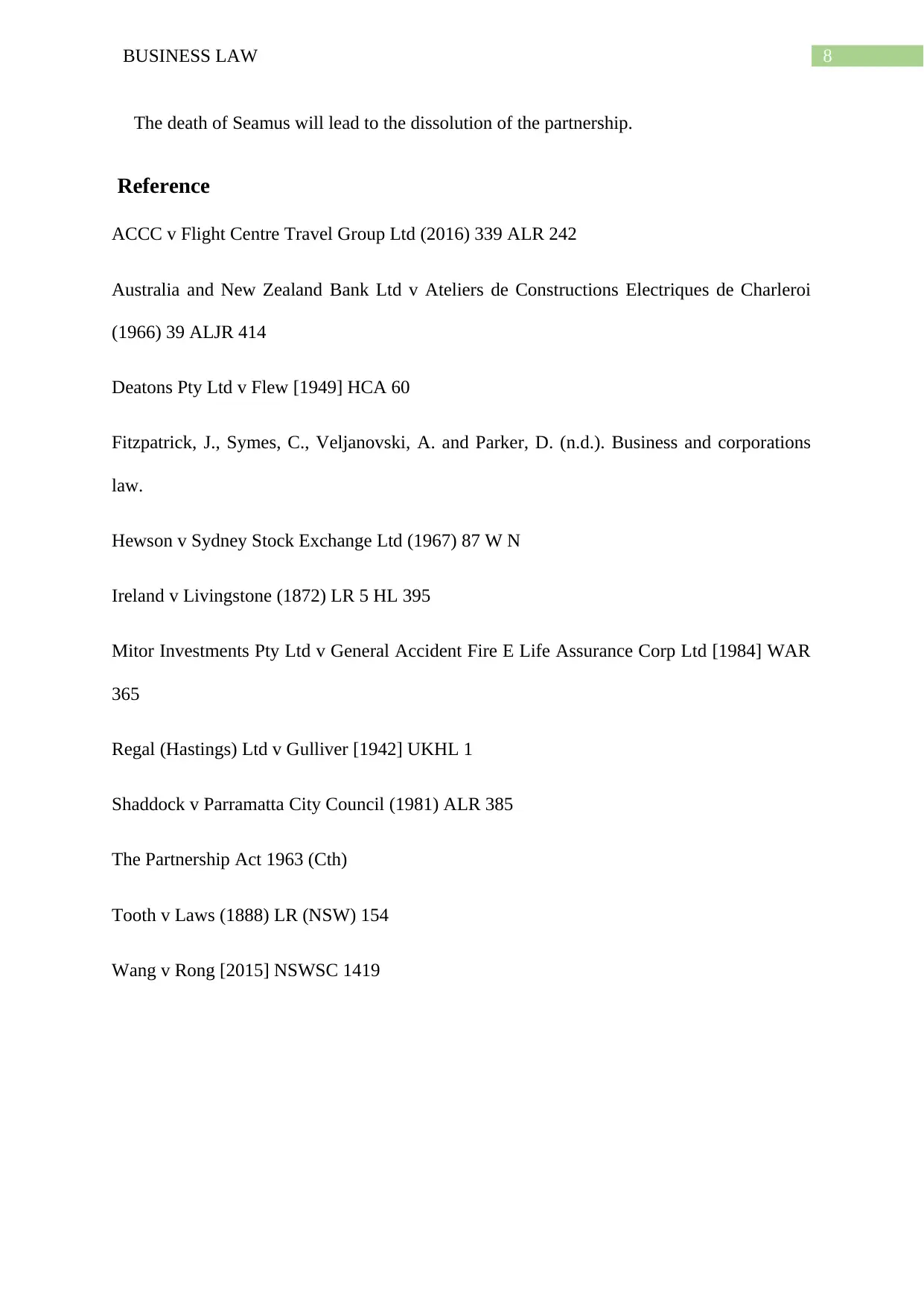
8BUSINESS LAW
The death of Seamus will lead to the dissolution of the partnership.
Reference
ACCC v Flight Centre Travel Group Ltd (2016) 339 ALR 242
Australia and New Zealand Bank Ltd v Ateliers de Constructions Electriques de Charleroi
(1966) 39 ALJR 414
Deatons Pty Ltd v Flew [1949] HCA 60
Fitzpatrick, J., Symes, C., Veljanovski, A. and Parker, D. (n.d.). Business and corporations
law.
Hewson v Sydney Stock Exchange Ltd (1967) 87 W N
Ireland v Livingstone (1872) LR 5 HL 395
Mitor Investments Pty Ltd v General Accident Fire E Life Assurance Corp Ltd [1984] WAR
365
Regal (Hastings) Ltd v Gulliver [1942] UKHL 1
Shaddock v Parramatta City Council (1981) ALR 385
The Partnership Act 1963 (Cth)
Tooth v Laws (1888) LR (NSW) 154
Wang v Rong [2015] NSWSC 1419
The death of Seamus will lead to the dissolution of the partnership.
Reference
ACCC v Flight Centre Travel Group Ltd (2016) 339 ALR 242
Australia and New Zealand Bank Ltd v Ateliers de Constructions Electriques de Charleroi
(1966) 39 ALJR 414
Deatons Pty Ltd v Flew [1949] HCA 60
Fitzpatrick, J., Symes, C., Veljanovski, A. and Parker, D. (n.d.). Business and corporations
law.
Hewson v Sydney Stock Exchange Ltd (1967) 87 W N
Ireland v Livingstone (1872) LR 5 HL 395
Mitor Investments Pty Ltd v General Accident Fire E Life Assurance Corp Ltd [1984] WAR
365
Regal (Hastings) Ltd v Gulliver [1942] UKHL 1
Shaddock v Parramatta City Council (1981) ALR 385
The Partnership Act 1963 (Cth)
Tooth v Laws (1888) LR (NSW) 154
Wang v Rong [2015] NSWSC 1419
⊘ This is a preview!⊘
Do you want full access?
Subscribe today to unlock all pages.

Trusted by 1+ million students worldwide
1 out of 9
Related Documents
Your All-in-One AI-Powered Toolkit for Academic Success.
+13062052269
info@desklib.com
Available 24*7 on WhatsApp / Email
![[object Object]](/_next/static/media/star-bottom.7253800d.svg)
Unlock your academic potential
Copyright © 2020–2026 A2Z Services. All Rights Reserved. Developed and managed by ZUCOL.





